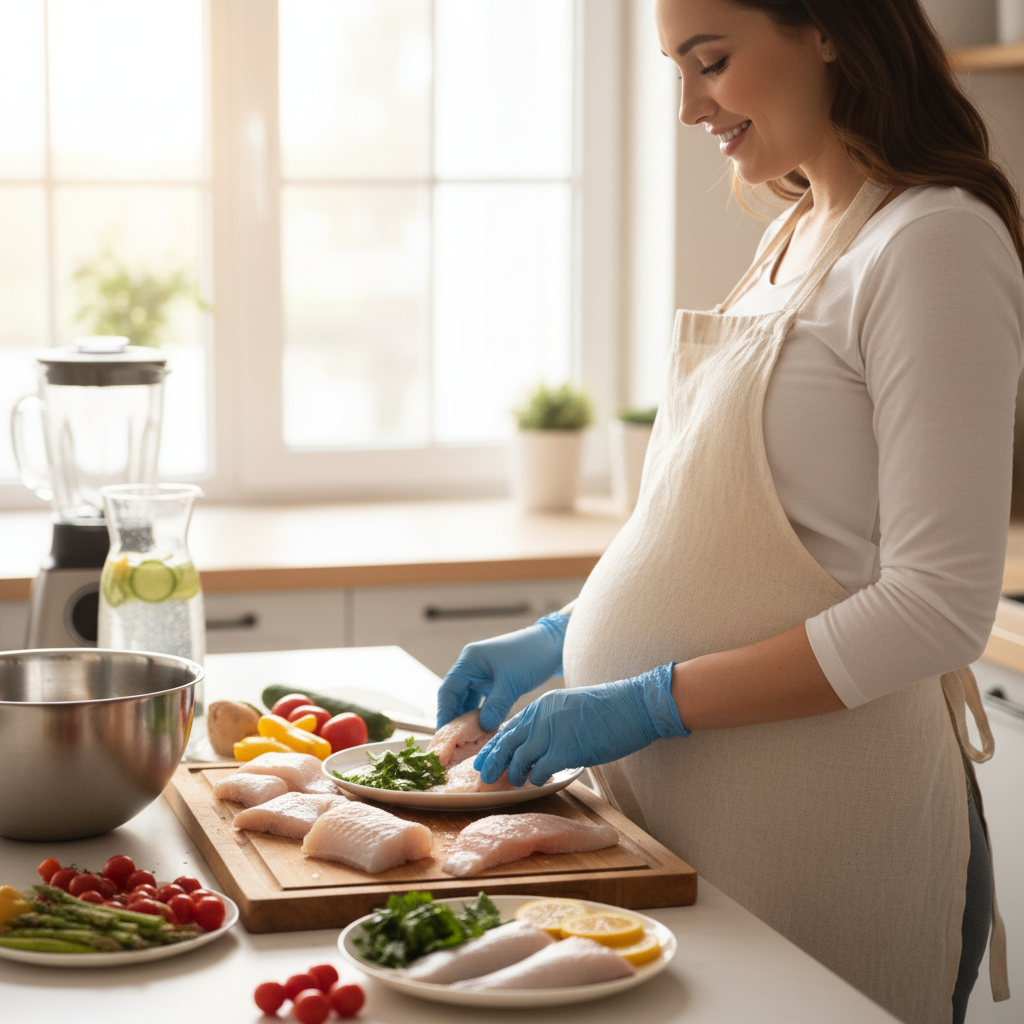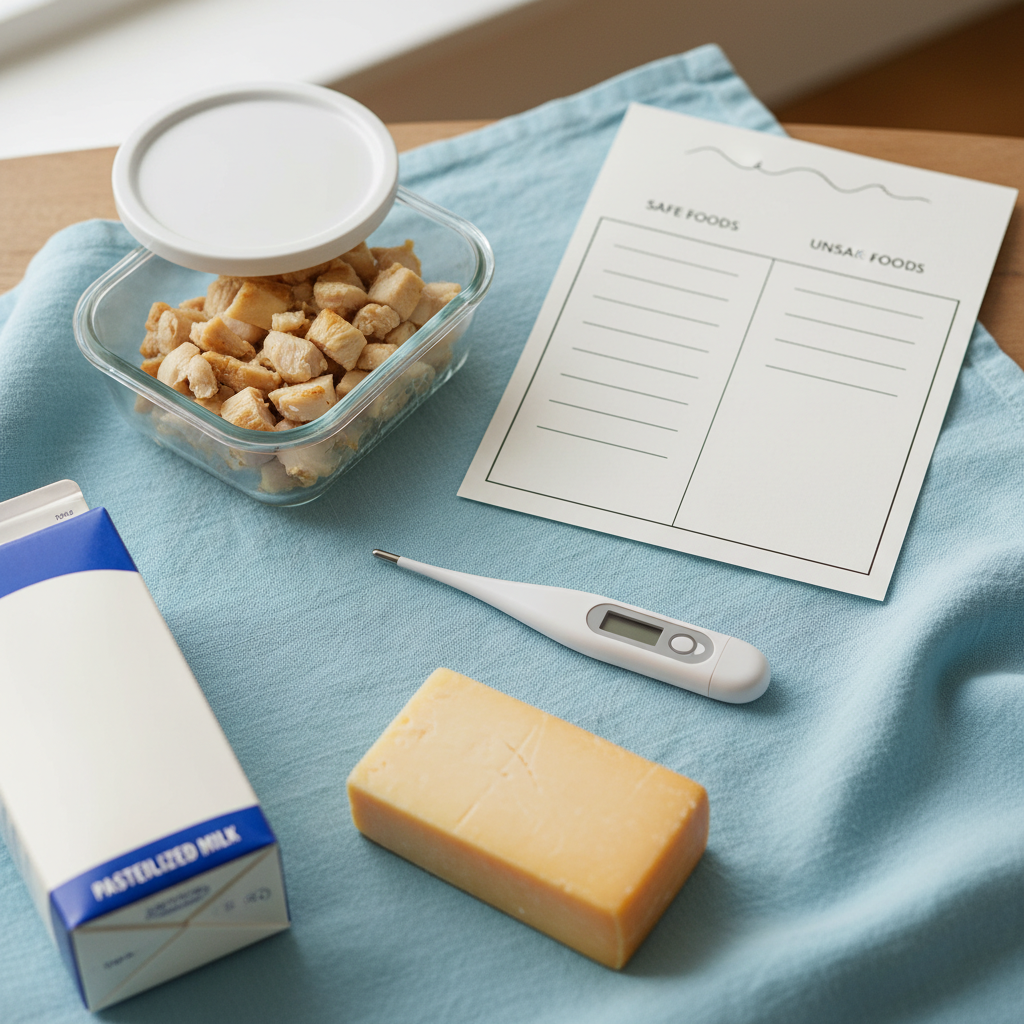
Foods to Avoid During the Second Trimester
The second trimester brings welcome relief from early pregnancy symptoms, but it also marks a critical period for your baby’s rapid development. During this time, being mindful about food safety becomes especially important as your baby’s organs and systems continue to form and grow.
Key Highlights
Here’s what you need to know about food safety during your second trimester:
- High-mercury fish like king mackerel and bigeye tuna should be avoided completely
- Raw or undercooked foods (meats, eggs, sprouts) carry increased risks of foodborne illness
- Unpasteurized dairy products, particularly soft cheeses, may contain harmful bacteria
- Deli meats should be heated until steaming hot before consumption
- Limit caffeine to 200mg daily (about one 12oz cup of coffee)
Understanding Your Changing Nutritional Needs

As you enter the second trimester, your baby’s development accelerates dramatically, with critical organ systems forming and maturing. Your immune system remains naturally suppressed during pregnancy, making you more vulnerable to foodborne illnesses that could potentially affect your baby. While your nausea may have subsided, this is not the time to relax food safety standards—in fact, it’s when careful attention to your diet becomes even more crucial.
What was once merely a personal food preference now has implications for your growing baby’s health. The placenta, while providing nutrients to your baby, can also allow certain harmful substances to pass through. Foods that might have caused only mild discomfort before pregnancy can now pose serious risks to your baby’s development, making this an important time to understand which foods require caution or complete avoidance.
Seafood Safety and Mercury Concerns
Fish provides essential omega-3 fatty acids that support your baby’s brain development, but not all seafood is safe during pregnancy. High-mercury fish are particularly problematic because mercury can cross the placenta and affect your baby’s developing nervous system. Completely avoid king mackerel, shark, swordfish, bigeye tuna, marlin, and tilefish from the Gulf of Mexico.
Instead, focus on low-mercury options like salmon, shrimp, pollock, tilapia, catfish, and canned light tuna (limit albacore tuna to 4 ounces per week). The FDA and EPA recommend eating 8-12 ounces (2-3 servings) of low-mercury seafood weekly during pregnancy to get the beneficial nutrients without the risks. Remember that cooking seafood properly is equally important—raw fish (including sushi and ceviche) should be eliminated from your diet to avoid parasites and bacteria that cooking would normally destroy.
Your Body’s Vulnerability to Foodborne Illness

During pregnancy headaches second trimester discomforts may distract you, but food safety deserves your focused attention. Your immune system changes during pregnancy to prevent your body from rejecting the baby, which unfortunately also reduces your ability to fight off certain infections. Foodborne illnesses like listeriosis can be significantly more severe during pregnancy and may lead to serious complications including miscarriage, preterm labor, or illness in the newborn.
Raw or undercooked animal products carry particular risks. Cook eggs until both whites and yolks are firm, meat to appropriate temperatures (145°F for whole cuts, 160°F for ground meat), and avoid raw sprouts completely as their growing conditions make them especially prone to bacterial contamination. Even pre-washed salads and raw vegetables should be thoroughly rinsed again before eating to reduce potential exposure to toxoplasmosis, a parasite that can cross the placenta and cause serious birth defects or pregnancy complications.
Dairy Dilemmas and Deli Counter Dangers
Unpasteurized dairy products pose a significant risk during the 2nd trimester due to potential Listeria contamination. Avoid soft cheeses like brie, camembert, blue-veined varieties, queso fresco, and feta unless the label specifically states they’re made with pasteurized milk. Hard cheeses like cheddar and parmesan generally remain safe choices, as do properly pasteurized yogurt and milk products.
Deli meats and ready-to-eat foods require special attention during pregnancy. Lunch meats, hot dogs, pâtés, and refrigerated smoked seafood can harbor Listeria bacteria that survive refrigeration temperatures. To enjoy these foods safely, heat deli meats and hot dogs until they’re steaming hot (165°F) before consumption. Canned or shelf-stable pâtés and meat spreads are safer alternatives to refrigerated versions. Pre-prepared deli salads (chicken, egg, tuna, seafood) also present contamination risks and are best avoided unless freshly made at home with proper food safety techniques.
Beverages and Hidden Food Hazards

What you drink during the 2nd month pregnancy period requires careful consideration. Alcohol should be completely avoided as it crosses the placenta and can affect your baby’s developing brain—no amount has been proven safe during pregnancy. Caffeine consumption should be limited to 200mg daily (approximately one 12oz cup of coffee) because it crosses the placenta and your baby cannot metabolize it efficiently. Be aware that caffeine hides in many foods and beverages, including tea, chocolate, some medications, and energy drinks.
Some foods contain surprising risks that aren’t widely discussed. Liver and other organ meats, while nutritious, should be limited due to their extremely high vitamin A content, which in excess may cause birth defects. Unripe papaya contains latex, which may trigger contractions. Minimize consumption of processed foods with trans fats and high levels of added sugars, which provide empty calories and may contribute to excessive weight gain, gestational diabetes, and other pregnancy complications. Always read food labels carefully to identify these hidden ingredients and make informed choices.
Building Your Food Safety Toolkit
Creating a food safety system for your kitchen helps protect both you and your baby during pregnancy. Wash your hands thoroughly before and after handling food, especially raw meat, eggs, and unwashed produce. Use separate cutting boards for raw meats and other foods to prevent cross-contamination. Cook foods to their appropriate temperatures: 145°F for whole cuts of beef, pork, and lamb; 160°F for ground meats; and 165°F for all poultry.
Keep your refrigerator at or below 40°F and your freezer at 0°F or below to slow bacterial growth. Refrigerate perishable foods within two hours of cooking or purchasing (one hour if the temperature is above 90°F). When dining out, avoid buffets where food may sit at unsafe temperatures for extended periods, and don’t hesitate to request that your food be thoroughly cooked. These simple practices significantly reduce your risk of foodborne illness during this critical second trimester when your baby is developing rapidly.
Moving Forward with Confidence
Making informed food choices during your second trimester helps create the safest environment for your developing baby. While these guidelines may seem restrictive, remember that this temporary adjustment in your diet supports your baby’s health during a crucial developmental period. With careful attention to food safety and smart substitutions, you can still enjoy a varied, nutritious, and satisfying diet.
Sources
U.S. Food and Drug Administration (FDA) – Food Safety for Pregnant Women
American College of Obstetricians and Gynecologists (ACOG) – Nutrition During Pregnancy
Centers for Disease Control and Prevention (CDC) – Foods Linked to Foodborne Illness
Mayo Clinic – Pregnancy Nutrition: Foods to Avoid During Pregnancy
